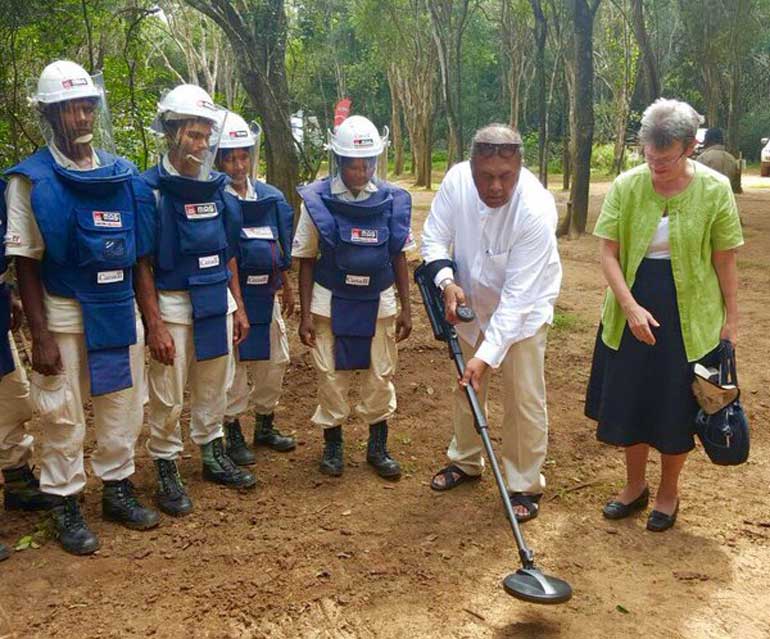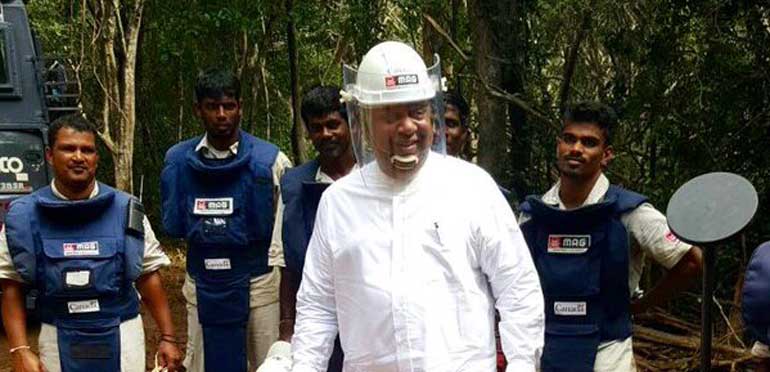Friday Feb 20, 2026
Friday Feb 20, 2026
Saturday, 19 December 2015 00:00 - - {{hitsCtrl.values.hits}}



Minister of Foreign Affairs Mangala Samaraweera and High Commissioner of Canada Shelley Whiting with members of the demining team
The High Commissioner of Canada to Sri Lanka and Maldives Shelley Whiting hosted the Minister of Foreign Affairs Mangala Samaraweera on 17 December to visit a Mines Advisory Group (MAG) demining site in Mannar to view demining activities being undertaken with Government of Canada funding.
Minister Samaraweera and High Commissioner Whiting observed demining activities being undertaken by the MAG team and took time to speak with some of the Sri Lankan demining team members, many of them women from the local area, who have made an invaluable contribution to making their communities safe and ready for resettlement through the ongoing demining work, including mine clearance and technical and non-technical surveys.
The Government of Canada provided $ 850 000 in support of work by MAG in 2015-2016 to remove landmines in the Mannar District in Sri Lanka. This year MAG has released over 25 million square metres of highly productive land benefitting over 21,000 people. In addition 7,342 mines have been removed by MAG in 2015 – a huge tally. This contribution forms a part of a total Government of Canada contribution of two million to MAG for demining in Sri Lanka since 2009. The Government of Canada has also supported the demining work of HALOTrust in Sri Lanka with 1M from 2009-2011.
The High Commissioner of Canada Shelley Whiting stated, “The demining activities that we saw today underscored for me the critical importance of demining work in Sri Lanka. Clearance of landmines is a necessary precursor to the peace and security for all Sri Lankans and is a key component of Sri Lanka’s broader plans for reconciliation and resettlement. Canada’s support to MAG is playing an important role in helping Sri Lanka meet its objective of being mine-impact free by 2020. Seeing MAG’s work today and noting the level of strong and constructive coordination with the Government at all levels, I am confident that this objective will be met.”
High Commissioner Whiting further commented, “Canada’s support builds on the significant work already undertaken in mine clearing in the country by the Government of Sri Lanka, the Sri Lankan army, the UN and international demining organisations such as MAG. The devastating impact of landmines is without question. It is my hope that the considerable work undertaken by the Government of Sri Lanka with the support of partners such as Canada will save lives, facilitate returns and lead to eventual accession by Sri Lanka of relevant international treaties aimed at bringing an end to the use of these indiscriminate weapons.” Canada initiated the process that led to the negotiation of the Landmine Treaty – the Ottawa Convention, and was the first State to sign and ratify it in December 1997. Canada became a State party to the Ottawa Convention and its domestic implementing legislation came into force on 1 March 1999 when the Convention entered into force. Canada is a member of the newly-created Committee on Cooperative Compliance, which is working to examine compliance issues of the Ottawa Convention, in particular use or allegations of use of mines by States parties (SPs) to the Convention.
In March 2015, the Government of Canada announced Canada’s ratification of the Convention on Cluster Munitions, and $ 2.4 million in support of demining efforts, including demining activities in Sri Lanka.
This funding builds on previous significant Government of Canada contributions to demining efforts in Sri Lanka through support to international mine clearing organisations such as MAG and HALOTrust, whose operations have resulted in removing a large variety of explosive devices from former conflict areas.
This has in turn helped to resettle thousands of displaced people in their original places of abode, and has reopened valuable and productive agricultural space –contributing to economic growth, livelihood needs and food security. Since 2006, Canada has provided $ 231 million to address the humanitarian impact of landmines and cluster munitions around the world.